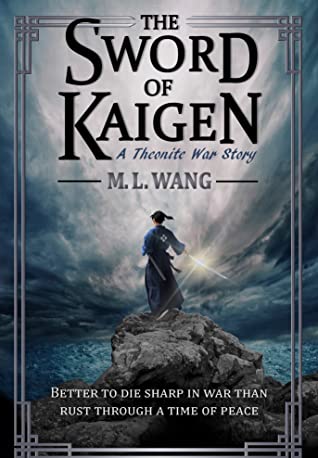William Ray reviewed The Sword of Kaigen by M. L. Wang (Theonite)
Review of 'The Sword of Kaigen' on 'Goodreads'
4 stars
The Sword of Kaigen is a mix of brilliant feudal drama in a strange fantasy world that takes place in a very modern time period. In some ways, it reads like an amazing piece of fan-fiction for Avatar: The Last Airbender, although I worry that comparison diminishes what the author has actually accomplished here. Conversely, it leans much harder into in-world immersion than I prefer, and tinkers with language and culture in ways that feel, at times, a little awkward for a stand alone story.
It starts off by announcing what planet the story takes place on, but there is only one planet ever discussed in the book -- I later learned that The Sword of Kaigen is actually a prequel to another series that is a portal fantasy involving Earth. It may be that the various issues that, for me, pulled this down from a 5-star read, all stem from references back to adventures I've never read. As a result, in the early chapters I was unsure if this was more sci-fi or fantasy. The culture in which the story was set felt very feudal, with sharply defined class and gender roles, and Emperor worship, but there were also mentions of very modern technology (one of the main characters is installing cell towers to give the town Internet access). Those mysterious contradictions might be explained in the other books, but as a first time reader they were somewhat bewildering and made clearly picturing the setting a little more difficult.
The book is in English, mostly, but the characters would occasionally veer into a mix of mostly Japanese and fantasy words which I found off-putting. Perhaps the portal fantasy explains the spread of Earth languages, but on its surface, here it seemed like it was meant to be a fantasy language, and it was even the native tongue of the point-of-view characters, so translating random bits of that into a different language from the book's narrative felt decidedly odd. Other languages were spoken, generally shown in italicized English as characters swapped between them, so the inclusion of other Earth languages felt odd to me.
The other issue with language is that the setting was steeped in its own. Unlike Avatar, where people are just 'benders' of an element, here the various types of magic user (theonite) had their own unique names, which are frequently referenced long before the reader is given any explanation of what those names mean. My guess is that it makes sense if you've read the earlier Theonite books and already know the names, but since I read this as a stand-alone adventure, it just felt confusing. Worse, that cardinal sin of untranslated measure words was heavily indulged -- distance, even time, were referred to in their local variants, rather than in English. As a bit of linguistic flair, it's fine that some culture's second-tier measure word for time isn't the same length as our second-tier measure word for time, when that's a plot point... but it wasn't here. Unfortunately, that means that when told something is happening over a matter of 'gbaati', I can't possibly know what that means without a lot of contextual clues or referencing the glossary (which is trickier than needed on Kindle -- get on that, Amazon!).
Perhaps the different measure words, the shared real-world languages, the mix of high-technology with feudal social structures, and other aspects are important plot points in the Theonite series, but since I read this as a stand-alone, for me they were mostly detractions and distractions.
All that said, M.L. Wang's character work is nothing short of brilliant. The central themes of characters striving to fit impossible standards of perfection, of people fighting socialized constraint while failing to recognize those struggles in each other, were all incredibly compelling. In a world full of epic magic and dazzling swordplay, dangling on the brink of war, Wang makes us care far more about the impact it will have on the daily lives of her characters. The big machinations are made distant and almost unimportant in the face of more immediate family dynamics, love and loss.
Maybe the issues I had with this book are mooted by its predecessors. If that bit with the languages makes sense to you, and you already know how long a gbaati is, then I feel certain you will adore this story. If you're considering it as a stand-alone, I still say go forward with it -- even with the bits that felt awkward to me, it was totally worth it for the epic finale, and the tragedies and triumphs of the conclusion.

